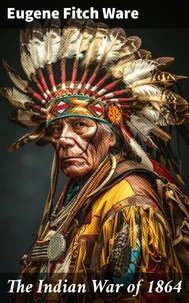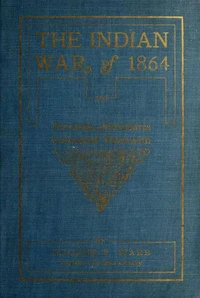The Indian War of 1864. Early History of Kansas, Nebraska, Colorado, and Wyoming
Par :Formats :
Disponible dans votre compte client Decitre ou Furet du Nord dès validation de votre commande. Le format ePub est :
- Compatible avec une lecture sur My Vivlio (smartphone, tablette, ordinateur)
- Compatible avec une lecture sur liseuses Vivlio
- Pour les liseuses autres que Vivlio, vous devez utiliser le logiciel Adobe Digital Edition. Non compatible avec la lecture sur les liseuses Kindle, Remarkable et Sony
 , qui est-ce ?
, qui est-ce ?Notre partenaire de plateforme de lecture numérique où vous retrouverez l'ensemble de vos ebooks gratuitement
Pour en savoir plus sur nos ebooks, consultez notre aide en ligne ici
- Nombre de pages390
- FormatePub
- ISBN859-65--4775497-8
- EAN8596547754978
- Date de parution16/12/2023
- Protection num.Digital Watermarking
- Taille3 Mo
- Infos supplémentairesepub
- ÉditeurDIGICAT
Résumé
Eugene Fitch Ware's "The Indian War of 1864" encapsulates a pivotal moment in the American frontier's tumultuous history. Employing a vivid narrative style interwoven with personal accounts and rich historical detail, Ware illustrates the complexities of this conflict, focusing on the struggles between Native American tribes and U. S. military forces. His immersive exploration of the war's events is framed within the broader context of westward expansion and the pervasive themes of colonialism and displacement.
Through meticulous research, Ware sheds light on the psychological and social dimensions of the combatants, thereby offering readers a nuanced perspective that transcends mere military chronicle. Eugene Fitch Ware, a multifaceted figure-poet, soldier, and journalist-was deeply influenced by his experiences serving in the Civil War and his love for the American landscape. His background as a frontier settler and later a participant in the war against the Plains tribes profoundly shaped his perspective and motivated him to document the narratives of both the soldiers and Native Americans.
Ware's empathy towards those involved is evident throughout his work, making it a significant historical reflection. This book is highly recommended for anyone interested in American history, military studies, or indigenous rights. Ware's work invites readers to engage critically with the past while offering valuable insights into the consequences of conflict and cultural encounter. In doing so, "The Indian War of 1864" stands not only as a historical text but as a timeless reminder of the complexities of the human experience.
Through meticulous research, Ware sheds light on the psychological and social dimensions of the combatants, thereby offering readers a nuanced perspective that transcends mere military chronicle. Eugene Fitch Ware, a multifaceted figure-poet, soldier, and journalist-was deeply influenced by his experiences serving in the Civil War and his love for the American landscape. His background as a frontier settler and later a participant in the war against the Plains tribes profoundly shaped his perspective and motivated him to document the narratives of both the soldiers and Native Americans.
Ware's empathy towards those involved is evident throughout his work, making it a significant historical reflection. This book is highly recommended for anyone interested in American history, military studies, or indigenous rights. Ware's work invites readers to engage critically with the past while offering valuable insights into the consequences of conflict and cultural encounter. In doing so, "The Indian War of 1864" stands not only as a historical text but as a timeless reminder of the complexities of the human experience.
Eugene Fitch Ware's "The Indian War of 1864" encapsulates a pivotal moment in the American frontier's tumultuous history. Employing a vivid narrative style interwoven with personal accounts and rich historical detail, Ware illustrates the complexities of this conflict, focusing on the struggles between Native American tribes and U. S. military forces. His immersive exploration of the war's events is framed within the broader context of westward expansion and the pervasive themes of colonialism and displacement.
Through meticulous research, Ware sheds light on the psychological and social dimensions of the combatants, thereby offering readers a nuanced perspective that transcends mere military chronicle. Eugene Fitch Ware, a multifaceted figure-poet, soldier, and journalist-was deeply influenced by his experiences serving in the Civil War and his love for the American landscape. His background as a frontier settler and later a participant in the war against the Plains tribes profoundly shaped his perspective and motivated him to document the narratives of both the soldiers and Native Americans.
Ware's empathy towards those involved is evident throughout his work, making it a significant historical reflection. This book is highly recommended for anyone interested in American history, military studies, or indigenous rights. Ware's work invites readers to engage critically with the past while offering valuable insights into the consequences of conflict and cultural encounter. In doing so, "The Indian War of 1864" stands not only as a historical text but as a timeless reminder of the complexities of the human experience.
Through meticulous research, Ware sheds light on the psychological and social dimensions of the combatants, thereby offering readers a nuanced perspective that transcends mere military chronicle. Eugene Fitch Ware, a multifaceted figure-poet, soldier, and journalist-was deeply influenced by his experiences serving in the Civil War and his love for the American landscape. His background as a frontier settler and later a participant in the war against the Plains tribes profoundly shaped his perspective and motivated him to document the narratives of both the soldiers and Native Americans.
Ware's empathy towards those involved is evident throughout his work, making it a significant historical reflection. This book is highly recommended for anyone interested in American history, military studies, or indigenous rights. Ware's work invites readers to engage critically with the past while offering valuable insights into the consequences of conflict and cultural encounter. In doing so, "The Indian War of 1864" stands not only as a historical text but as a timeless reminder of the complexities of the human experience.




